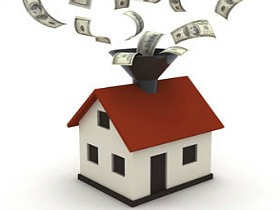What's Hot: Did January Mark The Bottom For The DC-Area Housing Market? | The Roller Coaster Development Scene In Tenleytown and AU Park
 How To Track the Value of Your Home
How To Track the Value of Your Home
✉️ Want to forward this article? Click here.

Homeowners regularly have one question on their mind: How much is my house/condo/co-op worth? So, UrbanTurf decided to put together a few tips for homeowners who want to stay up-to-date on the value of their home.
The tips below should only be used as a rough primer. The science of valuing a home is by no means exact, and perhaps the best and most accurate way to gauge one's home value is by digging down deep into comparable home sales from the last 3-5 months.
Comps and Contrast
Perhaps the best way to estimate the value of a home is to compare it to similar properties that have recently sold in the same area. The local multiple listings service (called MRIS in the DC area) is the most comprehensive source for listing searches, but websites like Zillow, Redfin and Trulia offer tools and options catered to value hunters, like being able to look up the recent sale prices for three-bedroom row houses in a specific zip code. Zillow in particular has a tool it calls Zestimate, in which you enter your address and out pops an estimate of value. (Note this should only be treated as a very rough estimate, which even the company itself has acknowledged.)
The trick is to use these websites wisely, says Jonathan Miller of Miller Samuel, a real estate appraisal consulting firm based in New York City. When comparing your home to others in the area, there are several components to keep in mind, Miller told UrbanTurf. For example, you should not only be comparing the size of your house, but also the size of the lot it is built on. Other questions to consider:
- How many bedrooms and bathrooms does the house you are looking at have?
- How old is your house compared to the listing you are looking at?
- What style is the house?
- Has the home been renovated recently?
For condominiums and co-ops, the above criteria should be included in the comparison, as well as things like parking and building amenities. For example, if you are comparing your swimming pool-less condo to one that does have a building pool, then your home would likely be worth less.
Get it Appraised
Homeowners that want a more official gauge of how much their home is worth can get an appraisal. For those who go this route, it is important to work with an appraiser who is familiar with the local market where your home is located. If possible, also find out the specific comps (comparable homes) that the appraiser is using to determine the value of your home. Appraisals generally cost between $300 and $500.
Intangibles
While the two tips above are ways to calculate a range for how much your home is worth, when thinking about your home's value 5, 10 or 20 years down the road it is important to consider certain intangibles like how the neighborhood around it is improving, new public transportation options on the boards, whether or not the schools improving, etc.
Have a How To that you want UrbanTurf to tackle? Shoot us an email at editor2012@urbanturf.com.
Similar Posts:
See other articles related to: home prices, home values, how to
This article originally published at https://dc.urbanturf.com/articles/blog/how_to_track_the_value_of_your_home/5905.
Most Popular... This Week • Last 30 Days • Ever

As mortgage rates have more than doubled from their historic lows over the last coupl... read »

The small handful of projects in the pipeline are either moving full steam ahead, get... read »

Lincoln-Westmoreland Housing is moving forward with plans to replace an aging Shaw af... read »

The longtime political strategist and pollster who has advised everyone from Presiden... read »

A report out today finds early signs that the spring could be a busy market.... read »
DC Real Estate Guides
Short guides to navigating the DC-area real estate market
We've collected all our helpful guides for buying, selling and renting in and around Washington, DC in one place. Start browsing below!
First-Timer Primers
Intro guides for first-time home buyers
Unique Spaces
Awesome and unusual real estate from across the DC Metro














